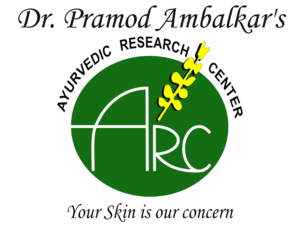- drambalkar@yahoo.co.in
- Mon - Sunday 10:00 AM - 02:00 PM
What Are The Causes And Symptoms Of Psoriasis?
Psoriasis is a chronic skin disease characterized by itchy, scaly patches that typically appear on the knees, elbows, trunk, and scalp. Unfortunately, there is no cure for psoriasis, making it a long-term condition. Its impact can extend beyond the skin, causing pain, disrupting sleep, and making it challenging to focus.
The disease tends to follow a cyclic pattern, flaring up for a few weeks or months and then subsiding temporarily. Certain triggers, particularly in individuals with a genetic predisposition, can exacerbate psoriasis. These triggers may include infections, cuts or burns, and specific medications.

While there’s no definitive cure, various ayurvedic treatment for psoriasis are available to help manage the symptoms of psoriasis. Additionally, adopting certain lifestyle habits and coping strategies can contribute to a better quality of life for individuals living with psoriasis. By combining treatments, lifestyle adjustments, and coping techniques, it is possible to effectively handle the challenges posed by psoriasis and improve overall well-being.
Common signs and symptoms of psoriasis include:
- An irregular rash, which can take different forms, ranging from small dandruff-like scales to extensive eruptions covering a large portion of the body.
- The appearance of the rash may differ based on skin color. On brown or Black skin, the rashes tend to be shades of purple with gray scales, while on white skin, they are more likely to be pink or red with silver scales.
- In children, small scaling spots are common manifestations of psoriasis.
- The affected skin is often dry and may develop cracks that can lead to bleeding.
- People with psoriasis may experience itching, burning, or soreness in the affected areas.
- Psoriasis tends to follow a cyclic pattern, with rashes flaring up for a few weeks or months, followed by periods of subsidence.
There are several types of psoriasis, each of which varies in its signs and symptoms
- Plaque psoriasis:- The most prevalent type of psoriasis, results in dry, itchy, and raised skin patches (plaques) covered with scales. These plaques can be few or numerous and typically occur on areas like the elbows, knees, lower back, and scalp. The color of the patches varies, depending on the individual’s skin color. After healing, the affected skin may temporarily change in color (post-inflammatory hyperpigmentation), particularly on brown or Black skin. Our dedicated ayurvedic skin specialist doctor is here to provide the expertise and support you need to manage psoriasis through plaque psoriasis treatment to restore your skin’s health.
- Nail psoriasis:- Nail psoriasis is a condition where psoriasis affects the fingernails and toenails, leading to several nail abnormalities. It can cause pitting, abnormal nail growth, and changes in nail color. Psoriatic nails may also become loose and separate from the nail bed, a condition known as onycholysis. In severe cases, the nails may crumble due to the impact of the disease.Our ayurvedic skin doctor are here to help you manage your psoriasis using Nail Psoriasis Treatment to restore the health of your skin.
- Guttate psoriasis:- Guttate psoriasis is most commonly seen in young adults and children. It is often triggered by bacterial infections, such as strep throat. This type of psoriasis is characterized by small, drop-shaped, scaling spots that appear on the trunk, arms, or legs. Guttate Psoriasis Treatment is the treatment that our ayurvedic skin specialist recommend to restore your skin health.
- Inverse psoriasis:- Inverse psoriasis primarily affects the skin folds in areas like the groin, buttocks, and breasts. It leads to smooth patches of inflamed skin that worsen with friction and sweating. This type of psoriasis can be triggered by fungal infections. Our dedicated ayurvedic doctor for skin is here to provide the expertise and support you need to manage psoriasis through Inverse psoriasis treatment to restore your skin’s health.
- Pustular psoriasis:- Pustular psoriasis is a rare form characterized by distinct pus-filled blisters. These blisters can appear in widespread patches or on small areas of the palms or soles. Our dedicated ayurvedic skin specialist doctor is here to provide the expertise and support you need to manage psoriasis through Pustular psoriasis treatment to restore your skin’s health.
- Erythrodermic psoriasis:- Erythrodermic psoriasis is the least common type and can cover the entire body with a peeling rash. The rash may cause intense itching or burning. Erythrodermic psoriasis can be either short-lived (acute) or long-term (chronic). Our dedicated ayurvedic skin specialist doctor is here to provide the expertise and support you need to manage psoriasis through Erythrodermic psoriasis treatment to restore your skin’s health.
When to Seek for Ayurvedic Skin Doctor
If you suspect that you may have psoriasis, it is important to promptly consult your ayurvedic skin specialist. Additionally, seek medical care if:
- Your condition becomes severe or spreads extensively.
- You experience discomfort and pain due to psoriasis.
- The appearance of your skin raises concerns.
- The symptoms do not improve with treatment.
Early diagnosis and appropriate medical attention can help in managing psoriasis effectively and improve your quality of life.

Get in Touch with us Today to Begin Your Journey of Transformation

Contact Us
- Dr.Ambalkars Aayurvedic Research Centre, ARC Bhavan, Vijay Vihar Complex, Evershine City, Last Stop, Vasai (E)
- drambalkar@yahoo.co.in
- +91 9320193201
- +91 9766362776

